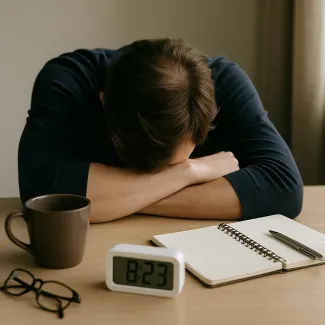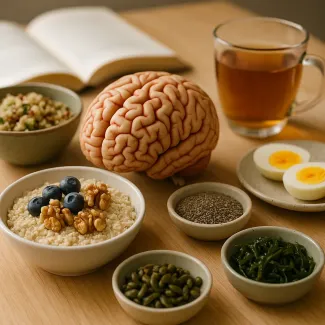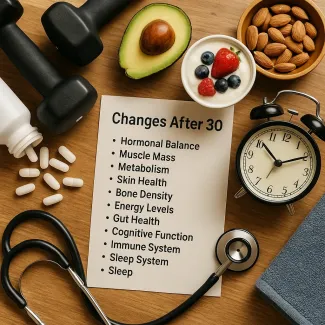
Constant Exhaustion in Your 30s: What Your Body Is Trying to Tell You
Uncover the Overlooked Triggers Behind Your Day-to-Day Fatigue
Feeling constantly tired in your 30s isn’t just an inconvenience — it’s a signal from your body that deserves attention. While it's tempting to blame your schedule, responsibilities, or age, chronic fatigue often has deeper, multifaceted causes. In this article, we explore the real reasons behind your ongoing tiredness, even after a full night’s sleep, and offer practical strategies to reclaim your energy.
Understanding Fatigue That Doesn’t Go Away
Not Just “Normal” Tiredness
Everyone gets tired. But when you feel drained every day, even after rest, your fatigue is no longer “normal.” It's persistent fatigue that can interfere with work, social life, and even self-care. It often points to more than one contributing factor — sometimes biological, sometimes behavioral, and sometimes psychological.
Difference Between Fatigue and Sleepiness
It’s important to distinguish fatigue from sleepiness. While sleepiness can often be resolved with adequate sleep, fatigue is more complex and persistent. People suffering from fatigue describe feeling mentally foggy, physically weak, and emotionally depleted — a full-body exhaustion that doesn’t disappear with a nap.
Lifestyle Habits That Drain Your Energy
Inconsistent Sleep Patterns
Late nights, early alarms, or irregular sleep schedules can disrupt your circadian rhythm, which controls your sleep-wake cycle. Over time, poor sleep hygiene leads to cumulative sleep debt — a major contributor to chronic exhaustion.
Tips to support your sleep:
- Go to bed and wake up at the same time daily.
- Limit screen time before bed.
- Avoid caffeine and alcohol in the evening.
- Keep your bedroom cool and dark.
Overreliance on Caffeine
Relying on coffee or energy drinks to get through the day may feel helpful in the short term, but it can actually lead to a crash in energy levels later on. Over time, your body builds tolerance to caffeine, making it less effective and even disruptive to sleep.
Lack of Physical Activity
Paradoxically, not exercising can make you more tired. Physical activity boosts mitochondrial health, increases oxygen circulation, and stimulates the production of endorphins — all of which promote vitality.
Incorporate movement like:
- 30-minute brisk walks
- Short morning yoga sessions
- Desk stretching if you work from home
Poor Dietary Choices
A diet high in processed foods, sugar, and refined carbs can cause spikes and crashes in blood sugar, leaving you feeling sluggish. Skipping meals, especially breakfast, can deplete your body’s energy reserves early in the day.
Choose nutrient-rich options such as:
- Complex carbs (oats, quinoa, sweet potatoes)
- Lean proteins (eggs, legumes, fish)
- Healthy fats (avocados, olive oil, nuts)
- Hydration from water and herbal teas
Hidden Health Conditions That Cause Fatigue
Thyroid Imbalances
Your thyroid gland regulates metabolism and energy. Conditions like hypothyroidism — where the thyroid is underactive — often cause extreme tiredness, weight gain, depression, and sensitivity to cold. Blood tests can detect thyroid dysfunction, and treatment often includes hormone replacement therapy.
Iron Deficiency and Anemia
Low levels of iron reduce your body’s ability to carry oxygen to muscles and tissues. This leads to symptoms like fatigue, pale skin, shortness of breath, and heart palpitations. Women in their 30s are especially vulnerable due to menstrual blood loss.
Boost iron through:
- Red meat, spinach, lentils
- Iron supplements (only with professional advice)
- Consuming vitamin C to aid iron absorption
Vitamin D Deficiency
Spending most of your time indoors can lead to a lack of vitamin D, which supports bone health, immune function, and mood regulation. Fatigue is one of the most common symptoms of deficiency, along with bone aches and low mood.
Insulin Resistance
When your body stops responding effectively to insulin, your cells can't absorb glucose — leading to low energy. This prediabetic state is often linked with belly fat, sugar cravings, and an afternoon energy crash.
Chronic Inflammation
Low-grade, persistent inflammation — often caused by stress, poor diet, and lack of sleep — can result in fatigue, brain fog, and a weakened immune system. Conditions like autoimmune diseases (e.g. lupus, rheumatoid arthritis) also cause inflammation-driven exhaustion.
Mental and Emotional Exhaustion in Your 30s
Stress and Cortisol Dysregulation
Chronic stress leads to elevated cortisol levels, which initially make you feel wired but eventually leave you burned out. This imbalance disrupts sleep, digestion, and mood — contributing to long-term fatigue.
Anxiety and Depression
Emotional fatigue is real. Both anxiety and depression sap your mental energy, reduce motivation, and cause physical symptoms like muscle tension, insomnia, and appetite changes. Seeking support from mental health professionals can help restore balance.
Burnout Syndrome
Especially common in professionals and caregivers, burnout is a state of emotional, physical, and mental exhaustion caused by prolonged stress. Symptoms include cynicism, reduced performance, and feeling emotionally numb.
Hormonal Shifts in Your 30s
Cortisol and Adrenal Fatigue
While not a medically recognized diagnosis, many people report symptoms consistent with adrenal fatigue — a condition where prolonged stress depletes the adrenal glands. Symptoms include fatigue, cravings for salty foods, and trouble getting up in the morning.
Estrogen and Progesterone Fluctuations
For women, the 30s can mark the beginning of hormonal fluctuations, especially before pregnancy, after birth, or leading into perimenopause. Imbalances between estrogen and progesterone can lead to fatigue, irritability, and poor sleep.
Testosterone Levels in Men
Men may also experience gradual drops in testosterone during their 30s, which can affect energy, muscle mass, libido, and mood. This is often overlooked due to cultural expectations around male vitality.
Environmental and Behavioral Factors
Screen Exposure and Blue Light
Excessive exposure to screens, especially before bedtime, suppresses melatonin production, delaying sleep and reducing sleep quality. Using blue light filters, limiting phone use at night, and choosing real books over e-readers can help reset your rhythm.
Noise Pollution and Sleep Quality
Even if you sleep for eight hours, light or fragmented sleep caused by environmental noise (traffic, neighbors, electronics) can result in morning grogginess. Consider white noise machines, earplugs, or window insulation to improve rest.
Toxin Exposure
Long-term exposure to environmental toxins — from plastics, pollution, household cleaners, or pesticides — may contribute to fatigue by stressing detoxification systems in the liver. Eating organic when possible and using natural cleaning products may reduce this burden.
When to See a Healthcare Professional
If you’ve adjusted your habits and still feel constantly exhausted, it’s time to get medical evaluation. Blood tests can uncover deficiencies, hormonal imbalances, or undiagnosed chronic conditions. Don’t ignore symptoms like:
- Fatigue that lasts more than a few weeks
- Unexplained weight changes
- Mood disturbances
- Sleep disruptions that don’t improve
Practical Daily Habits to Rebuild Your Energy
Prioritize Rest and Recovery
Schedule non-negotiable downtime, naps when needed, and consistent bedtime routines. Don’t equate productivity with self-worth — rest is regenerative and vital.
Create an Energy-Conserving Routine
Batch tasks, eliminate multitasking, and break your day into energy cycles — work in high-focus blocks, followed by recovery periods. Learn to say no when necessary.
Build an Energy-Supportive Diet
Adopt anti-inflammatory eating by including leafy greens, berries, olive oil, turmeric, and omega-3s. Eat regularly to stabilize blood sugar and avoid long gaps between meals.
Hydrate Consistently
Even mild dehydration can cause fatigue and headaches. Aim for at least 2 liters of water daily, more if active or in hot climates. Add electrolytes if needed.
Move Your Body Every Day
Even low-impact exercise like walking, pilates, or gentle swimming can reset your metabolism and uplift mood. Morning movement also reinforces your natural circadian rhythm.
Supplement Smartly (With Guidance)
Depending on lab results, consider:
- Iron for anemia
- Vitamin D3 for deficiency
- Magnesium for sleep and muscle recovery
- B-complex vitamins for cellular energy
Always consult a healthcare provider before starting new supplements.
Reconnecting With Your Energy in Your 30s
Your 30s can be an exciting and demanding decade — filled with career growth, relationships, and responsibilities. But constant tiredness is not something to accept as normal. Whether caused by poor sleep, nutritional gaps, hormonal shifts, or emotional overload, fatigue in your 30s is often reversible.
By tuning in to your body, making intentional daily choices, and seeking the right support, you can restore your vitality and reclaim the energy to live your fullest life.





